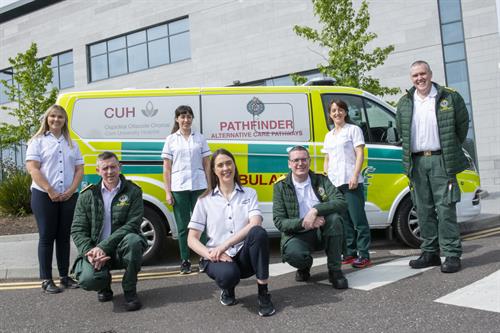Pre Hospital Emergency Medicine
Pre Hospital Emergency Medicine
Prehospital Emergency Medicine (PHEM) refers to the provision of immediate medical care and interventions to individuals experiencing emergencies or acute medical conditions outside of a hospital setting. This field of medicine focuses on delivering timely and effective medical assistance at the scene of an emergency, during transportation to a medical facility, or in other non-hospital settings. The goal is to stabilise patients, alleviate symptoms, and initiate critical care measures before they reach a hospital .
Cork University Hospital Emergency Department is not just a place or a building; it is a service that has evolved with time to serve the community we all live in. We are continuously developing novel ways of delivering care across the spectrum of emergency presentations from resuscitation to more minor emergency presentations within the walls of the hospital and far beyond.
For many years, we have provided Pre-hospital Emergency Medicine (PHEM) doctors to provide life-saving resuscitation procedures. They work with colleagues in the National Ambulance Service on a voluntary basis; when called by the National Emergency Operation Centre who take that initial 999/112 call, these doctors get to the patient; whether it be placing that patient in a drug induced coma or commencing a blood transfusion while the patient is still trapped in a crashed car, these doctors have saved lives and ensured much better outcomes for those treated.

All boats at sea in Irish waters and Irish registered vessels across the world have access to senior clinical decision makers working at CUH ED through MEDICO Cork. Established in 2001, Medico Cork is the Health Service Executives (HSE) National 24 hour Emergency Telemedical Support Unit. The service also supports clinical decision making by Advanced Paramedics working with the National Ambulance Service across the country. In recent years Medico Cork has been extended to provide support to our Irish Defence Forces on deployment in the Mediterranean and Mali.
MEDICO Cork guarantees direct access to specialist medical advice from an Emergency Medicine Registrar ± Consultant through various Service Level Agreements (SLAs) with a range of State Emergency Service and military assets.

At Cork University Hospital (CUH), the Alternative Pre-hospital Pathway (APP) Team is a bespoke model of pre-hospital healthcare delivery which complements the national shift toward integrated community care.
The Alternative Pre-hospital Pathway (APP) service, founded in November 2019, comprises an Emergency Medicine doctor with an Emergency Medicine Technician from the Ambulance Service responding in an ambulance car. The team attend low acuity calls that come through the 999/112 system across the 7 days of the week, typically attending 8-10 patients per day. They respond to everything; from patients who are frail and elderly who may have had a fall at home ensuring the myriad of reasons that cause such falls are assessed for, to patients who have blocked catheters or wounds or have had a low velocity road traffic collision. The service manages to assess and complete treatment at the scene in 70% of patients. This saves that patient the journey to the Emergency Department, and frees up an ambulance to respond to more serious emergencies. The team works closely with the services in CUH and the Mercy Emergency Departments as well as the community services.
The APP Team at CUH ED is just one example of how novel collaborative initiatives between community, pre-hospital and hospital services are driving the health service towards delivery of patient-centred integrated community care.

Pathfinder is a collaborative service between the National Ambulance Service (NAS) and CUH Occupational Therapy and Physiotherapy Departments. The service consists of an Advanced Paramedic and Occupational Therapist (OT) or Physiotherapist (PT) responding to 112/999 calls.
Pathfinder is improving outcomes for older people by minimising unnecessary ED attendances and offering safe alternative care pathways for older people in their own homes rather than in hospital.

Featured News

CUH Major Trauma Symposium: May 24th, 2024
Join us for the Major Trauma Symposium, presented by Cork University Hospital (CUH) and the National Office for Trauma Services, featuring an array of esteemed

Trauma on the Farm: Injury Prevention Advice
Dr Jason van der Velde, Pre-Hospital Emergency Medicine Specialist and Clinical Lead HSE National Telemedicine Support Unit (Medico Cork) The agri/aqua-food sector is Ireland’s most

Caring for Patients in CUH ED
Siobhan Scanlon, Assistant Director of Nursing, explains the priorities for staff engaging with patients arriving into the ED at CUH The Emergency Department exists to

How to make your house safe for young children
Written by Dr Rory O Brien, Clinical Lead of Emergency Medicine and Consultant in Paediatric Emergency Medicine in CUH The most effective means of
